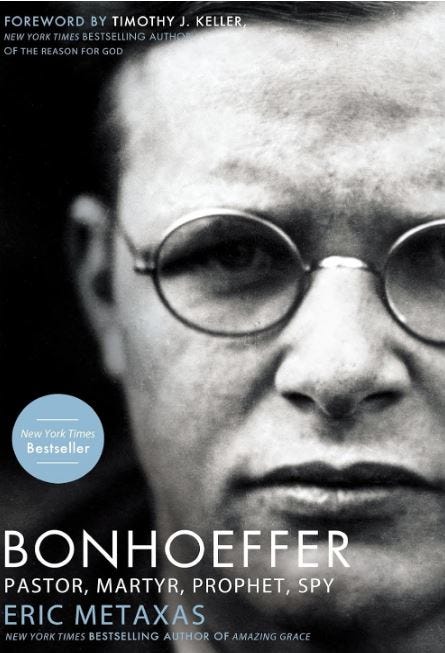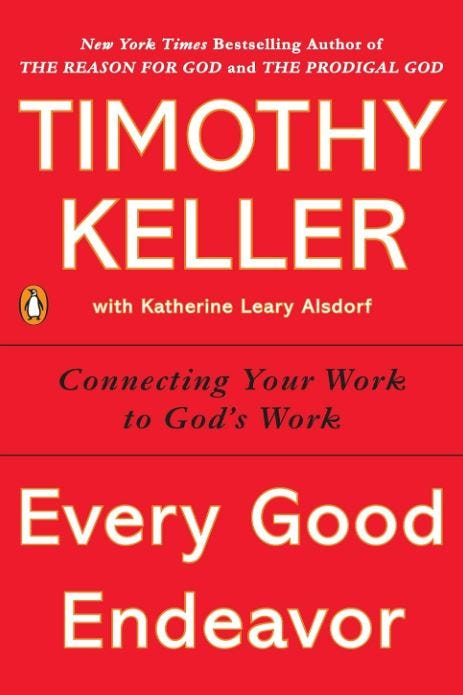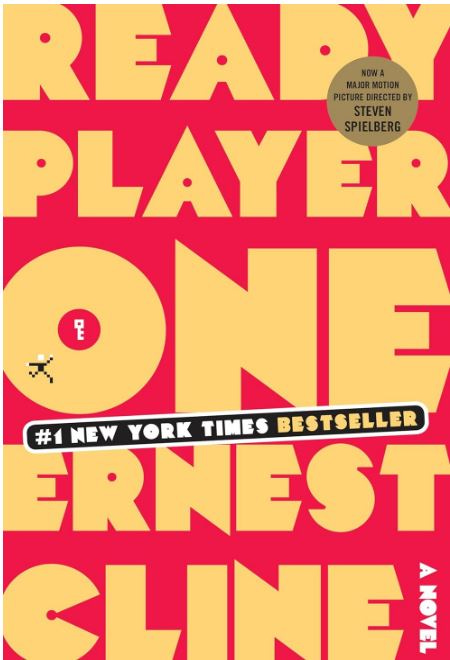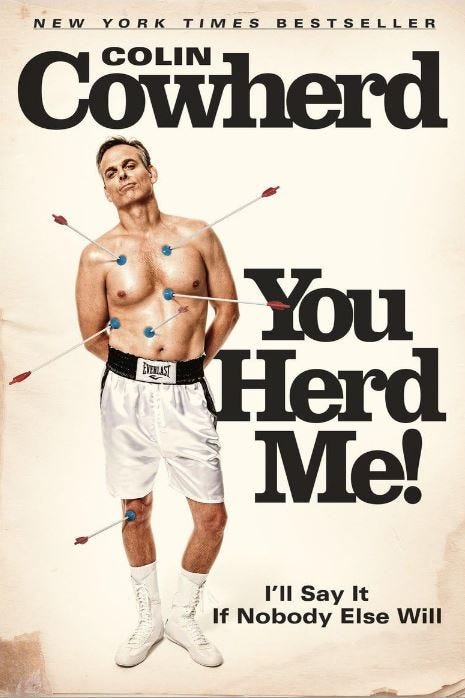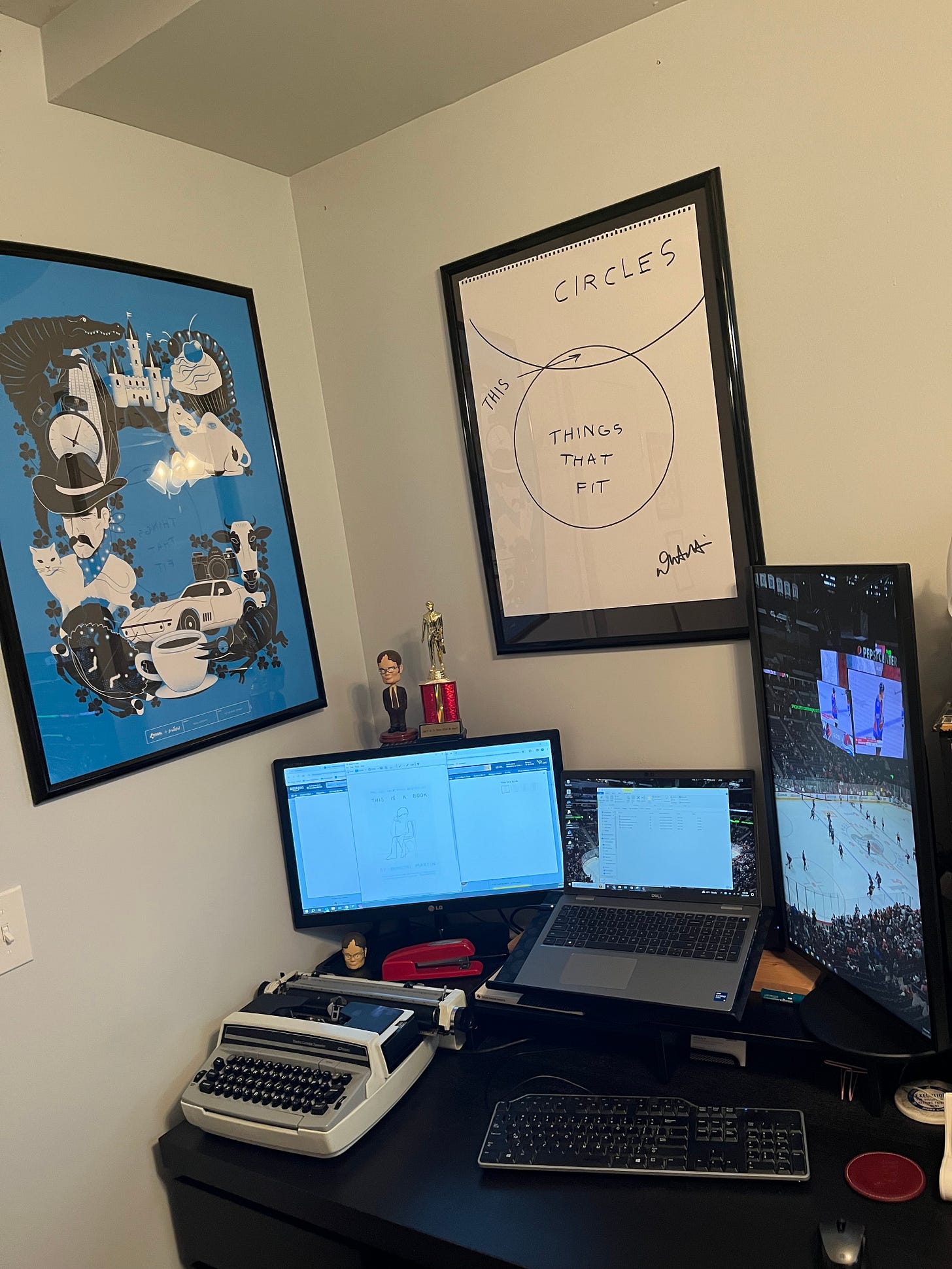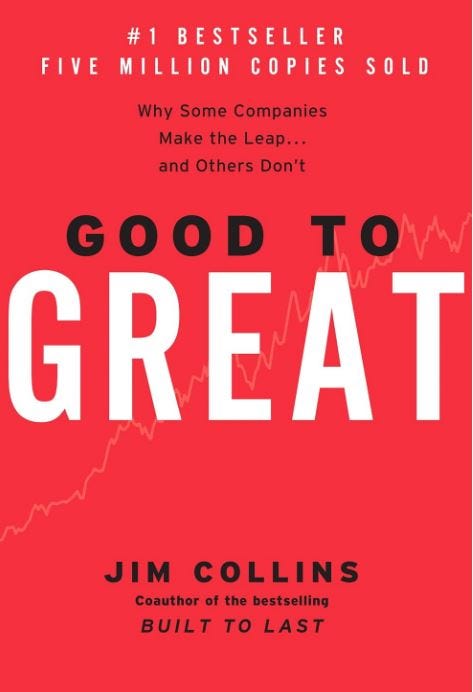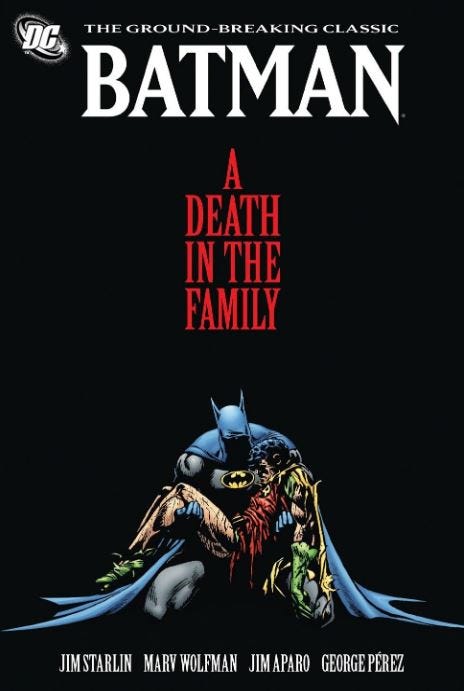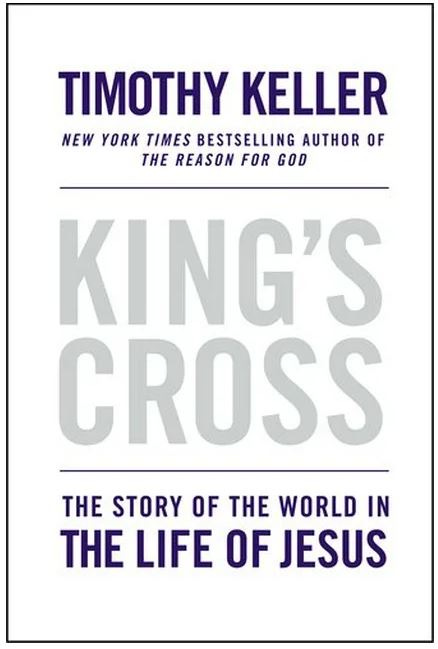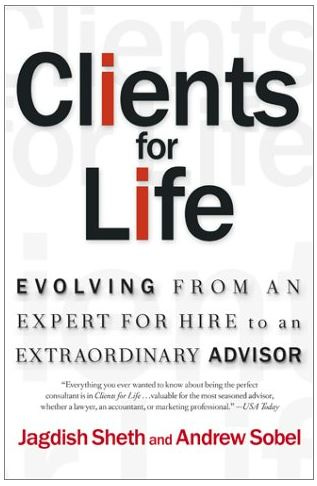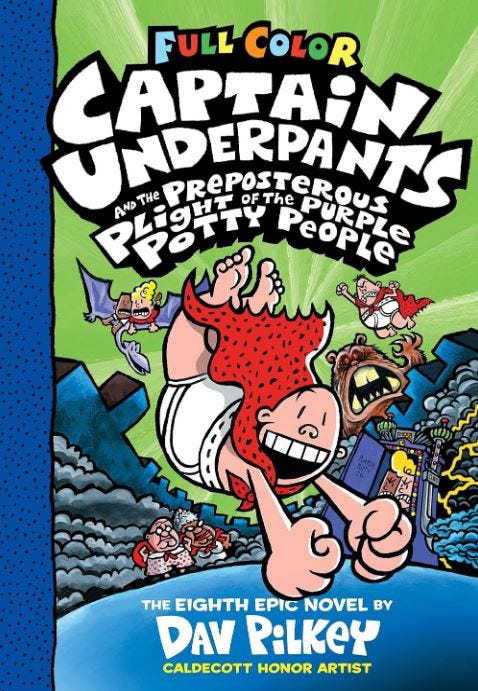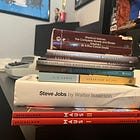1. Bonhoeffer by Eric Metaxas
2. Every Good Endeavor by Tim Keller
3. Ready Player One by Ernest Cline
4. You Herd Me! by Colin Cowherd
5. This is a Book by Demetri Martin
6. Good to Great by Jim Collins
7. A Death in the Family by Jim Starlin
8. King's Cross by Tim Keller
9. Clients for Life by Jaydish Sheth and Andrew Sobel
10. Captain Underpants and the Preposterous Plot of the Purple Potty People by Dav Pilkey
●●●
I wanted to share my annual lists of Top 10 Books Read, but I debated where to start. On one hand, it would seem more relevant to begin with the most recent and work backward. Certainly, those reading choices say more about how I think today and what is shaping my worldview, interests, and desires. But then again starting at the end betrays the destination. Sure, you know where you are, but the person you are has had the benefit of firing away all the impurities over time. All the dumb ideas. All the bad influences. All the stupid opinions.
Or so it seems.
This is obviously not the case, but it is our perception. The reality is, we just hold our current dumb ideas in much higher regard simply because they're current. We think we’ve learned, and maybe we have, but we also don't know what it is we're still learning. So, despite my current infatuations, it is impossible for me to know how the things I read just last year will fit in the totality of my makeup. I believe reading fundamentally shapes who we are and who we are to become. But the process doesn't end when the book is placed on the shelf. It is rather just beginning. As we forget the things we underlined but vividly recall certain anecdotes. As we botch the quotes but recall their substance. As we look back and think, "why the hell did I like that way back then?" I won't pretend to have these questions all answered for this particular list. But I am 11 years further into that process when I look back on my favorite reads of 2013 than I am for my favorite reads of 2023. Also, I just thought of this. Cut me some slack.
Eventually I'll get to present day. And maybe I'll have something to say. But maybe not. I might have to get back to you in a decade.
●●●
I have kept a journal since March 6th, 2009. I use the term journal loosely. It's mostly a notebook filled with things that I felt compelled to write down. Reminders, lists, outlines, sermon notes, fart jokes, reflections, stuff that happened, quotes, love songs to Margaret Thatcher. There's a reason the word diary sounds so much like diarrhea.
In 2012, I was living alone in a shitty studio apartment and had most evenings completely to myself. No roommates, a recently acquired ex-girlfriend, no pets. I made it through every active season of Breaking Bad on Netflix and would orient my afternoons around when Jeopardy! came over the air on my TV antenna. I was thick in the process of wrapping up my Graduate year of engineering school, so I had little desire to read for fun after spending the day reading nerdy articles about the proper aggregate size of standard-cured molded concrete cylinders, and then writing about the proper aggregate size of standard-cured molded concrete cylinders. My creativity had atrophied during my years in engineering school. My desire to read along with it.
At the end of 2012, I created six different Top 5 lists. None of them included books of any form.
Here were the victors:
Top Movie of 2012: The Dark Knight Rises
Top Team of 2012: The USA
Top Album of 2012: The Peace of Wild Things by Paper Route
Top TV Show of 2012: Duck Dynasty (It also won spots 5 through 2)
Top Thing of 2012: No New Transformers Movie
Top Winner of 2012: The World (After surviving the Mayan Apocalypse)
As the calendar flipped to 2013, I became reflective. This was my final semester as a full-time student. I had already accepted a job and knew that my field of study was completely irrelevant to my future employer. I cared a lot less about learning structural engineering. I worked hard to finish strong, and even won a few awards along the way for our final engineering project (the irony was not lost on my fellow classmates). But I knew adulthood was coming, and I wanted to be ready for it. And that adulthood would have very little to do with the properties of steel gusset plates or shear walls.
Looking through the old lists in my journals, I was trying pretty hard at this self-reflection thing. On March 11th, 2013, I made three new lists: books to read, monthly expenses, and "goals to help make a healthy transition to real life.”
Despite its omission from my prior Top 5 lists, the first 3 goals all had to do with reading:
Start reading often for fun
Start reading to stay up to date
Start reading for personal/spiritual development
I didn't do a lot of the other things on that particular list, but a decade later I can say that these first three objectives have been met. I still think they're pretty good goals.
●●●
My wife likes to underline books, and it drives me fucking crazy. I have zero interest in seeing what other people thought was interesting. It completely deadens my experience of reading. The underlines overtly shout what the most important pieces are, rather than inviting you to unearth those discoveries on your own. If I have any interest in reading the copy of a book I purchased for her, I give her specific instructions that she needs to mark her most salient moments elsewhere and not directly on the page.
But in the event I really want to read The Three Musketeers but don't want to purchase a new copy, there is one saving grace from the terrors of a graffitied paperback. Her underlines always lose steam 50 pages in or sooner. Toward the middle, and certainly at the climax, her experience of reading has shifted from 'let's make sure I'm being a smart person capturing all the smart things,' to either: a person just trying to get through the book (glass half empty), or someone that's been thoroughly caught up in the actual experience of reading (glass half full).
I've noticed this phenomenon in not just my wife, but also in the underlined books that I have purchased from used bookstores. Even the manuscripts of things I've written are handed back to me with the editor’s ink front loaded. Our interactions with text tend to shift as we go along. We either enjoy it more or enjoy it less, either way we seem less inclined to get a pen out and vandalize in the meantime.
I only read 13 books in 2013, and as you can tell from the Top 10 list, a few of them were a stretch of the definition of 'book.' But it was a start. People have written a bunch about what it takes to start a habit, insert your favorite Malcolm Gladwell quote here. But in the annals of my journals, there are signs of a slightly more valiant effort than my initial list shows. I had a lot of false starts on different books people told me to read.
It took me a little while to discover what kind of books I liked, I hadn't read by choice as an adult yet. Thick in the early pages of the 2013 journal editions are copious notes from Gospel by JD Greear, The Mortification of Sin by John Owen, and The Practice of the Presence of God by Brother Lawrence. I remember little from any of these books, other than I never finished them. And have no intentions to. But I got a lot of quotes written down. I still hadn't learned how to spend my time on reading that captured my interest. I was doing a lot of reading that I thought I was supposed to be doing, not reading that I actually wanted to do. I've gotten a lot better at that over the years.
●●●
1. Bonhoeffer by Eric Metaxas
Sometimes our opinions of books change over time because of the subject, other times they change because of the author.
I attended a lecture by James K.A. Smith and everything was going pretty well until the Q&A. There was a system in place to screen questions, but we had time on hand and this crowd seemed civil, so they opened it up to the audience. An old man wearing a homemade t-shirt with some sort of slogan ironed on stood up dramatically. I would say with gusto. Collectively the room took a deep breath and thought, “oh boy, here we go.”
In a firm tone, he began his critique with: "Eric Metaxas said..."
It was uncomfortable. Clearly this dude had some sort of axe to grind, and he had been sitting on it the whole time. It’s got to be uncomfortable sitting on a dull axe through an entire lecture. Luckily James K.A. Smith wasn't as caught off guard as I was.
"I find that quote interesting given its author’s opinion of our current President."
The year was 2017.
ZING!!
My opinion of Eric Metaxas hasn't aged well. I don't spend a lot of time dissecting him, but I've found associating with people I find immoral and despicable (or going beyond and esteeming them) a pretty reliable way for me to value your opinion less. We can all have bad ideas and be nice to each other about it, but I don’t really want to read your books. I have others on my list that I can work through first.
There’s a lot of irony in re-reading my Bonhoeffer notes and considering our current political climate. I want to tread carefully here. There's a saying about how it only takes a certain number of exchanges on social media for someone to be compared to Hitler or called a Nazi, this is not my attempt here. But what I found most profound about Dietrich Bonhoeffer was his unwavering desire and courage to call out evil, particularly institutional evil, when he saw it. He did this despite myriad forces externally that told him he was either wrong or simply foolish to do so.
Just check out these quotes:
"Bonhoeffer's three conclusions- that the church must question the state, help the state's victims, and work against the state, if necessary- were too much for almost everyone. But for him they were inescapable. In time, he would do all three." -Metaxas
"But the other piece of this puzzle has to do with the confusion that inevitably arises when the Christian faith becomes too closely related to a cultural or national identity. For many Germans, their national identity had become so melted together with whatever Lutheran Christian faith they had that it was impossible to see clearly. After four hundred years of taking for granted that all Germans were Lutheran Christians, no one really knew what Christianity was anymore."- Metaxas
"(Hitler) knew quite well how to deal with these Protestant pastors. 'You can do anything you want with them,' he once remarked. 'They will submit... they are insignificant little people, submissive as dogs, and they sweat with embarrassment when you talk to them.'”- Metaxas (and that one Hitler part)
Sounds familiar to me. If history is a meant to teach us a lesson, well I'm not sure what all of Mr. Metaxas's research of Mr. Bonhoeffer did for him. I’m sure it shaped him. It’s hard for me to see. But maybe you can.
There are some other good quotes in there about other stuff too:
"What made (Bonhoeffer) stand out, to some as an inspiration, to others an oddity, and to others as an offense, was that he did not hope that God heard his prayers, but knew." -Metaxas
"It's not your love that sustains the marriage, but from now on, the marriage sustains your love." -Bonhoeffer
"And we simply cannot be constant with the fact that God's cause is not always the successful one, that we really could be 'unsuccessful'; and yet be on the right road. But this is where we have begun in faith or in a burst of enthusiasm."-Bonhoeffer
I don’t really understand what the phrase "simply cannot be constant" means, but I think I get the gist of it. I did Google it again, along with “what does simply cannot be constant mean.” The internet didn’t know either. I still like it though, even if I don’t really like Mr. Metaxas so much.
●●●
2. Every Good Endeavor by Tim Keller
This dude has not had the same issues, my respect for Keller has only increased over the last decade. Probably a good thing since he shows up on this list twice. It would have been pretty embarrassing otherwise.
This is one of those books that I still think about, explicitly and implicitly. It’s Keller's treatise on the nature and design of work from a theological perspective. How work is not a curse, but it is cursed. How fulfillment can't be found apart from work, but it cannot be found in work alone. It's pretty well thought out, and resonated both with someone just entering the full-time workforce and from the perspective of someone that has been at the same job for a decade. You should read this one.
Keller will make a few more appearances, both in 2013 and beyond, but to this day Every Good Endeavor is the work of his that I reference the most.
"Part of the curse of work in a fallen world is frequent fruitlessness."
"(Fruitlessness) means that, in all work, we will be able to envision far more than we can accomplish, both because of lack of ability and because of resistance in the environment around us."
"Work will always fall short of what you imagined it could be because we are not meant to be fulfilled in this world."
"...a worldview is not merely a set of philosophical bullet points. It is essentially a master narrative, a fundamental story about (a) what human life in the world should believe, (b) what has knocked it off balance, and (c) what can be done to make it right."
Pretty good stuff.
●●●
3. Ready Player One by Ernest Cline
Ok, I was ahead of the curve on this one. I don't care if you don't believe me.
Remember that random book list I mentioned in the introduction? Probably not since I’m sure you just skipped the intro and decided to skim the reviews of the few books you’ve heard of. But this one was on it.
I knew a guy who kind of made a big deal about how reading was his thing. He was gifted a book-a-month subscription for Christmas, where you fill out a list of books that you like, and then someone randomly mails you a new book that they think you might enjoy based off the list you compiled. (I ended up getting Paige a subscription to this as a present. It was moderately successful).
Ready Player One was the first book they sent him, and he thought it was awesome. One day I was eating tacos with this guy and said, "I'm trying to get back into reading, give me a biography and a fiction book that I should read."
He suggested Wizard by Marc Seifer about Nikola Tesla, which I started but never finished (I'll try again one day), and Ready Player One.
I devoured this read on the Kindle Paperwhite that I was gifted for graduating college. I grew tired of reading on Kindles after a while, and last Christmas Paige bought me a hard copy of Ready Player One just so I could put it on my shelf and look at the spine. It’s got a real sexy spine.
If you've never heard of this book, well then, you’re definitely not reading my book list. So, there's no point in me explaining it to you. But I loved it, I listened to a podcast describe it as 'eating cotton candy.'
I really like cotton candy.
●●●
4. You Herd Me! I'll Say it if Nobody Else Will by Colin Cowherd
I listened to a lot of sports radio during this era. This was the heyday of ESPN Radio. It was great. The early work commute had Mike and Mike in the Morning. The afternoon timeslot was the Scott Van Pelt Show. The late afternoon was some miserable local sports guy that made your ears bleed and further appreciate how good the pros were. And then there was my favorite. Sandwiched between 10:00AM and Noon, a time that I was never actually in my car but always wanted to be, was the joyous The Herd with Colin Cowherd.
The Mikes and Scott Van Pelt were good. They were smart. But Colin Cowherd was brilliant. I could listen to him analyze paper towels, but he just so happened to talk about sports. He was so well thought-out and so well-spoken that if I ever heard one of my idiot friends say, "oh I hate Colin Cowherd" I would roll my eyes the same way I would if someone said, "oh I hate Plato."
(For the record, I have told people that "I hate Shakespeare." Shakespeare makes me feel stupid.)
It's fine if you don't agree with everything Colin Cowherd thought or said. But you would have a hard time convincing me that you are more thoughtful or well-spoken on anything sports related and I should value your opinion more. So, when he wrote a book, I felt like I had just been invited to the cool kid in class’s birthday party. I was so excited.
"Two things make smart men stupid. Beautiful women and sports."
"Hating an athlete for being arrogant is like hating a bat for being nocturnal."
"Social media: don't do it after a cocktail or in your underwear."
"Bowling is the only sport where the better you are, the less attractive you are to the opposite sex."
"We often demand total transparency but, number one, total transparency doesn't exist, and two we're probably all happier if we don't know everything about everything."
“I asked my seven-year-old what love is. 'If someone fell off a cliff and died and I was sad.' Yep. Pretty much nailed it."
"Love your life, like your sports."
"How you do under pressure always reveals who you really are as a person. When you're in dire straits, the way you act …determines who you really are."
"If you resent success, you will never achieve it. Be excited about it, even if the success is not your own. Bitter people are rarely happy or successful."
The Mikes got split up, one got his own TV show and the other got a worse partner. Scott Van Pelt also got his own TV show and was forced into staring at a camera and just talking. I preferred when he was just talking. Only Colin stuck to what he was good at and kept the whole radio thing going. Except he now works for Fox and I have no idea if I get that radio channel. I'd like to know, but apparently not enough.
●●●
5. This is a Book by Demetri Martin
My brother let me borrow his copy of this book and I then lent it to my other brother. I'm pretty sure it never made it back to its home. I feel bad about that.
Demetri Martin is probably my favorite stand-up comedian. The fact that I'm stopping to think, "do I like any other stand-up comedians better?" is probably proof enough and I can stop wracking my brain. Wracking? Is that the metaphor? Like the Medieval torture device where they would pull all your limbs out of socket? Yeah, I can probably stop doing that to my brain. It needs to be in its sockets.
If you know Demetri Martin's humor, it's simple yet smart. He does a lot of visual comedy, and this book is his opus to that artform. I don't remember any of the jokes, but I remember laughing a lot. He's the only comic I've seen in person twice. The last time I even bought one of his sheets from a flip chart that had a joke on it he told during the show. I tried selecting one that would be funny without any explanation. One that people could just look at and say ‘ha, that's funny.' Turns out that's not how his jokes work. No one I've shown the flipchart to has gotten the joke without explanation. And my explanation isn't as funny as Demetri's. But I still like looking at it above my laptop in my home office.
His book isn't like that.
●●●
6. Good to Great by Jim Collins
This was the year that I started my real job, so I felt like I had to get 'businessy.' I bought businessy clothes. Got a businessy haircut. And read a lot of businessy books. More on that later.
This is one of those books that gets recommended all the time in businessy circles. I was reading it per a suggestion from my boss, primarily on airplanes during businessy trips. On one airplane ride I eavesdropped on my seatmate while he was reading and noticed he had his own copy of Good to Great. I pulled out my copy shoved in the seat back pocket between the safety card and puke bag and showed it to him. He was 'trying to apply some of the principles' to his own place of business. That’s what businessy people do. They apply principles to things.
Overall, it's a decent book. I appreciate how most of their conclusions about what makes a successful company ostensibly come from research. However, that research doesn't look so hot in retrospect. Ten years later, I’m not so sure of the job that Collins and his group of grad students that made him famous did. Other than obviously selling a lot of books. They did that part really well. Ultimately, it feels a little more like the cardinal sin of research: determine your conclusions first and then torture the 'data' enough so it can support those conclusions.
The premise is that Collins studied a bunch of companies that were just ‘good.’ And then years later they were 'great.' I'm sure he has a definition for what 'great' means, but for the purposes of this review we’ll just simplify it to 'whatever will get you to buy this book.’
But here lies a bit of a sticky point. Years later, the list of case studies doesn't feel so 'great' or even 'good' or even 'NOT a basket of deplorables’ or ‘NOT a sampling of some of the worst possible companies you could try to emulate.'
Here's an update on how a few of Collins's teacher pets are doing:
Circuit City: Bankrupt
Fannie Mae: Helped create the global housing crisis and Great Recession of 2008
Pitney Bowes: Has lost 88% of its stock value since the book published according to the blog I read
Wells Fargo: Paid $3B to the Securities and Exchange Commission to settle claims against it, then turned around and paid another $3.7B in fraud related charges for creating 1.5 million fake customer accounts. However, my Wells Fargo mortgage is very real. It also doesn’t feel so ‘great’ to pay it.
Doesn't look so hot at the moment. There are still some ‘good’ or maybe even ‘great’ companies in his initial list too, but that’s kind of how a random sampling works. And this wasn’t supposed to be random. Supposedly he had cracked it. He told us so.
So, can we just go ahead and all agree that, in fact, Jim Collins doesn't actually know what makes a great company because it’s wildly random and trying to codify it is a ridiculous notion that sells books at airports but doesn’t actually help any Chief Executive Officers?
HELL NO.
I heard someone pimping this book a few years ago at some training that was supposed to make me a better person and such. Because this is the kind of person I am, I asked the obvious question.
“Aren't a lot of those ‘Good to Great’ companies terrible now?"
The response from the ‘expert’ that our companies had paid hundreds of dollars for us to listen to went something like:
"Well Collins actually has a lot to say about that. Just because they were 'Great' companies when he looked at them doesn't mean they were going to be 'Great' companies forever. Things can change in a company, and they can fall away from the principles that made them ‘Great’, but that doesn't mean his core observations are wrong."
Of course they're not.
●●●
7. A Death in the Family by Jim Starlin
This one you might take issue with. That's fair. You could tell I wasn't exactly reading a lot of books back then, at least not enough to make a Top 10 list without dipping into comics.
Every year I buy my brother a few classic Batman graphic novels (pretentious way of saying a bunch of comics) and read them before I give him a birthday present. It’s mutually beneficial. If you're into Batman, there are a few that get brought up a lot. One is A Death in the Family about the amazing time they killed the single character that was in most dire need of a gruesome murder: Robin.
From what I've gathered, the DC Comics Execs realized that their current version of Robin was, how do you say it, terrible? So, they decided to write him into a real pickle and have the fans vote on whether or not he made it out.
Caesar issued his ruling. Thumbs: Down.
The comic itself has a great story, but man, as someone who’s loved Batman his whole life and has taught his son to say: "you like Robin" as the ultimate insult- it felt so satisfying to have Joker beat the shit out of him.
Almost as satisfying as when Carl got eaten by a zombie.
Sorry if you haven't gotten to that part yet in The Walking Dead. It's not like you haven’t had time.
●●●
8. King's Cross by Tim Keller
This one was re-published as Jesus the King, but I like the original name better. I helped lead a Bible Study on the book of Mark over the summer and we read this as a group. I don’t remember it much, or the study really, but it happened. I have notes to prove it. I'm sure Tim Keller was real smart in it.
●●●
9. Clients for Life by Jaydish Sheth and Andrew Sobel
It's kind of brutal to write an essay where, by design, the topics get less interesting the longer you write. It's pretty obvious now why most of these Top 10 lists go backward. Then again, you would have never made it to the good stuff if I started with this muck.
No one is going to go out and buy this book after reading this review. And you shouldn't. My boss gave me that list of businessy books I mentioned earlier, and this was just the least painful of the rest. My old boss might read this, so I feel compelled to say that he was an excellent first boss. I’ve just decided that the entire genre of businessy books are mostly money grabs.
I had some spots in my list to fill to make it to magic number 10. I should have just done a top 7. It’s God's favorite number after all.
The best quality about this book is that it wasn't one of the other following books that I read in my cubicle while pretending to work:
Why Good Clients Fire Great Companies
What Your Boss's Don't Know
Captain Underpants and the Revolting Revenge of the Radioactive Robo-Boxers
●●●
10. Captain Underpants and the Preposterous Plot of the Purple Potty People by Dav Pilkey
9/27/13
“I had a half hour to kill, so I walked into Target with the thought, 'maybe I can find a Batman Pez dispenser.' Walked out with an autographed copy of Captain Underpants. If that's not a good consolation prize, then I don't know what is.”
●●●
I really hope these lists get better as we go along.



